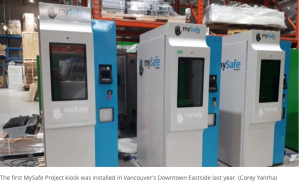 NCBI (The National Center for Biotechnology Information) reports that for safer drug supply there is a technology that can ‘dispense and monitor medications for opioid users. The My Safe machine is a biometric storage locker where people can pick up their prescribed medications.’ Wired magazine interviewed Dr. Mark Tyndall, a Harvard-trained doctor of infectious disease and epidemiology in Vancouver, who believes, “It’s the synthetic drugs – mainly fentanyl – that are cheaper, more potent, and easier to traffic. These substances have turned the drug supply toxic.” These machines allow pre-approved drug users to receive a prescription from their doctors to access safer opioids using a biometric scan of the veins in their hands. In just the last few years, dozens of ATM opioid-dispensing ATMS have opened from Vancouver to Toronto.
NCBI (The National Center for Biotechnology Information) reports that for safer drug supply there is a technology that can ‘dispense and monitor medications for opioid users. The My Safe machine is a biometric storage locker where people can pick up their prescribed medications.’ Wired magazine interviewed Dr. Mark Tyndall, a Harvard-trained doctor of infectious disease and epidemiology in Vancouver, who believes, “It’s the synthetic drugs – mainly fentanyl – that are cheaper, more potent, and easier to traffic. These substances have turned the drug supply toxic.” These machines allow pre-approved drug users to receive a prescription from their doctors to access safer opioids using a biometric scan of the veins in their hands. In just the last few years, dozens of ATM opioid-dispensing ATMS have opened from Vancouver to Toronto.
Discussion: This new harm reduction effort is part of a Canadian pilot program, and I am both intrigued and conflicted. I am intrigued because the war on drugs has not worked, overdose deaths are soaring, fentanyl is flooding the streets, and harm-reduction initiatives have been shown to save lives. I am also conflicted because this idea seems radical; however, needle exchange and injection sites seemed radical to me, too, when they were first introduced. Dr. Mark Tyndall believes that, “Criminalization is just a way to institutionalize stigma. Making drugs illegal does nothing to stop people from using them.” It is his belief the vending machines will help save lives.
For today, let us keep an open mind, educate ourselves, and learn about new harm-reduction initiatives. As for ATM opioid-dispensing kiosks, I’m still undecided, but I am committed to learning more.
